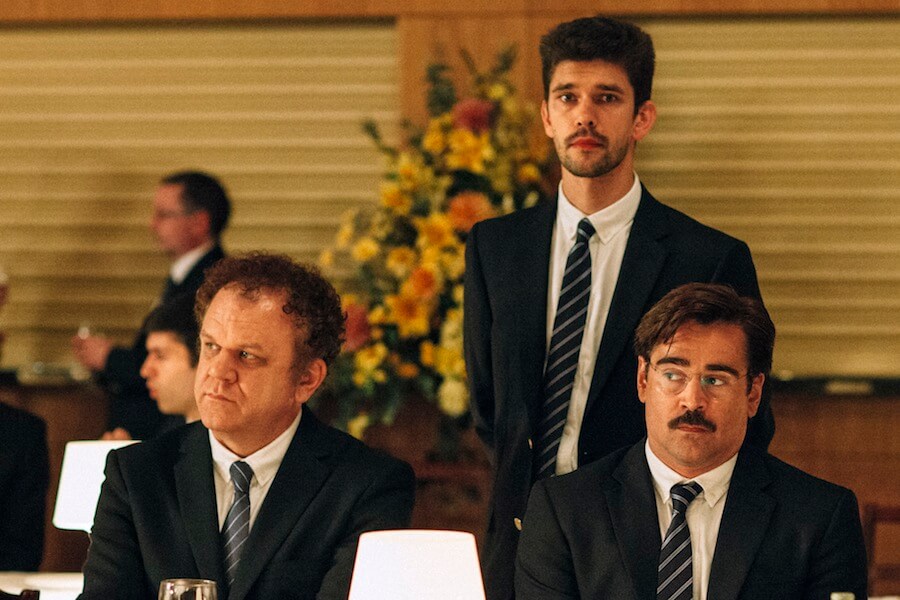‘The Lobster’ “The Lobster” isn’t technically a comedy, but it has more jokes than most Adam Sandler movies, and quite a lot more that actually land. They’re not nice jokes. The laughs, which come early and often, stick in the throat. The alterna-world Greek director Yorgos Lanthimos creates is a grim yet silly (yet very, very grim) one: Single people are rounded up and sequestered in a posh, country hotel, where they’re given 45 days to find a mate. If they fail, they’re turned into an animal (of their choice, which is nice). Our hero, a freshly divorced sadsack played with dry commitment by Colin Farrell, has chosen a lobster. Why? His reasoning is simple and thought-out: They live long and he likes the sea. RELATED: Interview: Colin Farrell wants “The Lobster” to make us think It’s important that “The Lobster” is consistently funny. Otherwise it might send us walking in front of a bus. It still does damage. It’s life viewed at its most pessimistically, not just to get us down but to force us, like the best absurdist works, to reexamine the cruelties we accept as fine. Lanthimos and cowriter Efthymis Filippou’s most obvious target is love and relationships. The dense and draconian rules of the hotel push its inhabitants into pairing off over shared tics: One young woman (Jessica Barden) gets nosebleeds; a a self-serious man (Ben Whishaw) has a limp. The two wind up matching, but only after the latter learns that if he bangs his head repeatedly and violently on tables he too can run red from the honker. Isn’t compatibility always some form of smoke and mirrors? Down with love! But “The Lobster” gets us so worked up to question if pairing off is a result of social systems or, if you will, animal instincts, that we might be peeved when it pulls out the rug. The story abruptly takes a mid-film shift: Farrell’s audience surrogate escapes into the nearby woods to join a gang of rebels called “The Loners.” Their ranks include a shortsighted woman (Rachel Weisz) who, unlike anyone at the hotel, actually catches his fancy. But though this group has thrown off the shackles of fascism, they’ve created a prison of their own: Pairing off is forbidden. (Ditto listening to music socially — earbuds, please.) The punishment is worse than the society they’re rejecting. RELATED: Interview: Sienna Miller would rather make crazy movies like “High-Rise” For viewers willing to go along with “The Lobster,” they’ll see a film that isn’t just about relationships, and made by people who may be not as bleak-o-rama as their movie. (Lanthimos is married, to actor Ariane Labed, present here as a casually sadistic maid. Making a dark comedy that does a reductio ad absurdum on love — how romantic.) At heart it’s really about dehumanizing systems, critical of the way people not only conform to silly social and political laws, but help perpetuate them through carefully trained apathy. The characters are barely there, as designed. Only Farrell’s David has a name; everyone else is credited with their ailment (“Lisping Man,” “Biscuit Woman,” “Heartless Woman,” who is indeed a sociopath). The actors, an international lot all forced to speak the same language and wear the same clothes (men, bland suits; women, sundresses), recite their dialogue in stilted deadpan. They were shorn of their humanity long before they arrived at a joint that would turn them into other creatures. This is Lanthimos’ third comedy-of-sorts about how people comply to (and sometimes flee from) dehumanizing systems. In “Dogtooth,” he showed a family whose controlling parents had fed their children, now young adults, ridiculous lies about the dangers of the world outside their remote estate. In “Alps” people dealt with grief by hiring actors to play their departed loved ones. “The Lobster,” his first in English, isn’t as funny or clever as “Dogtooth,” though that says more about that film’s sky-high excellence. But it is better at connecting its world to our own, at commenting, sharply and even nastily, on how we’re often architects of our own doom. It’s a rare film that makes us think while actually making us think. Follow Matt Prigge on Twitter @mattprigge
Director: Yorgos Lanthimos
Stars: Colin Farrell, Rachel Weisz
Rating: R
4 (out of 5) Globes
The grimly funny ‘The Lobster’ is not just down with love

A24


















